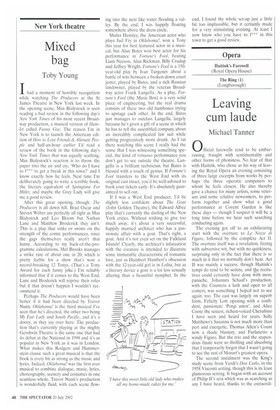Mixed bag
Toby Young
Ihad a moment of horrible recognition while watching The Producers at the St James Theatre in New York last week. In the opening scene, Max Bialystock is seen reading a bad review in the following day's New York Times of his most recent Broadway production, a musical version of Hamlet called Funny Guy. The reason I'm in New York is to launch the American edition of How to Lose Friends & Alienate People and half-an-hour earlier I'd read a review of the book in the following day's New York Times that was equally scathing. Max Bialystock's reaction is to throw the paper into the air and cry, 'Who do I have to r** to get a break in this town?' and I know exactly how he feels. Next time I'm deliberately going to write a terrible book, the literary equivalent of Springtime For Hitler. and maybe the Grey Lady will give me a good review.
After this great opening, though, The Producers is all down hill. Brad Oscar and Steven Weber are perfectly all right as Max Bialystock and Leo Bloom but Nathan Lane and Matthew Broderick they ain't. This is a play that sinks or swims on the strength of the comic performances, since the gags themselves really aren't that funny. According to my back-of-the-programme calculations, Mel Brooks manages a strike rate of about one in 20, which is pretty feeble for a show that's won a record-breaking 12 Tonys. (That's a Tony Award for each funny joke.) I'm reliably informed that if it comes to the West End, Lane and Broderick will reprise their roles but if that doesn't happen I wouldn't recommend it.
Perhaps The Producers would have been better if it had been directed by Trevor Nunn. Oklahoma! is the third musical I've seen that he's directed, the other two being My Fair Lady and South Pacific, and it's a doozy, as they say over here. The production that's currently playing at the mighty Gershwin Theatre is the same one that had its debut at the National in 1998 and it's as popular in New York as it was in London. What makes this Rodgers and Hammerstein classic such a great musical is that the book is every bit as strong as the music and lyrics. Indeed, Oklahoma! was the first ever musical to combine dialogue, music, lyrics, choreography, scenery and costumes in one seamless whole. Trevor Nunn's production is wonderfully fluid, with each scene flow
ing into the next like water flooding a valley. By the end, I was happily floating somewhere above the dress circle.
Shuler Hensley, the American actor who plays Jud Fry in Oklahoma!, won a Tony this year for best featured actor in a musical. but Alan Bates won best actor for his performance in Fortune's Fool, beating Liam Neeson, Alan Rickman, Billy Crudup and Jeffrey Wright. Fortune's Fool is a 150year-old play by Ivan Turgenev about a battle of wits between a broken-down court jester, played by Bates, and a rich Russian landowner, played by the veteran Broadway actor Frank Langella. As a play, Fortune's Fool (the Music Box) is a very solid piece of engineering, but the real drama consists of these two old hambones trying to upstage each other. In the end, Bates just manages to outclass LangeIla, largely because he's given a gift of a scene in which he has to tell the assembled company about an incredibly complicated law suit while getting progressively more drunk. As I sat there watching this scene I really had the sense that I was witnessing something special, the kind of virtuoso performance you don't get to see outside the theatre. Langella is a brilliant technician, but Bates is blessed with a touch of genius. If Fortune's Fool transfers to the West End with its original cast intact, you'd be well-advised to book your tickets early. It's absolutely guaranteed to sell out.
If I was a West End producer, I'd be slightly less confident about The Goat (John Golden Theatre), the Edward Albee play that's currently the darling of the New York critics. Without wishing to give too much away, it's about a very successful, happily married architect who has a passionate affair with a goat. That's right, a goat. And it's not even set on the Falkland Islands! Clearly, the architect's infatuation with the creature is intended to illustrate some immutable characteristic of romantic love, just as Humbert Humbert's obsession with the 12-year-old girl is in Lolita, but as a literary device a goat is a lot less sexually alluring than a beautiful nymphet. In the end, I found the whole set-up just a little bit too implausible, but it certainly made for a very stimulating evening. At least I now know who you have to f*" in this town to get a good review.


























































 Previous page
Previous page